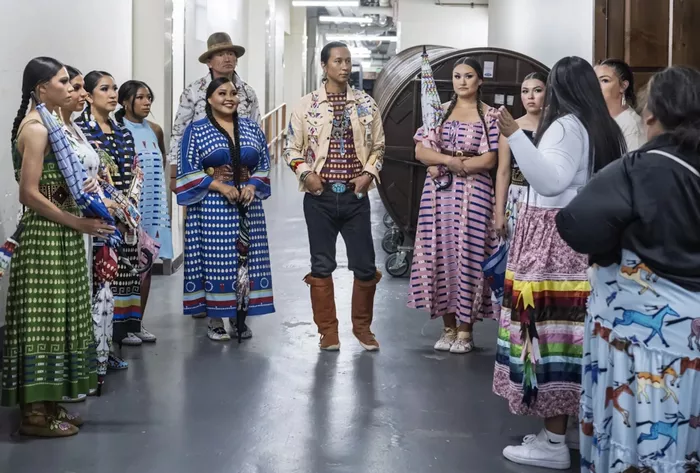In Santa Fe, New Mexico, Indigenous fashion took center stage during a vibrant three-day showcase beginning on May 9. Designers from across North America infused the event with creative expressions rooted in their heritage, culture, and daily experiences. This fashion week was anchored by a collaborative show between Santa Fe’s long-established Indian Market and a counterpart from Vancouver, Canada, embodying unity and creative independence among Indigenous communities. Additionally, an independent runway event in the city’s railyard district nearly doubled the excitement, filling backstage areas with designers, makeup artists, and last-minute fittings.
Designers brought a wide range of creations to the runways, featuring items such as silk parasols, quilted hoodies, knee-high fur boots, and suede earrings that reached the waist. Materials varied from wool trade cloth to animal hides and were adorned with beadwork, ribbons, and contemporary elements like digital prints and Native American streetwear. The models walking the runways included not only professionals but also dancers and notable Indigenous public figures, including government officials and TV personalities. Among those expected to walk was former U.S. Interior Secretary Deb Haaland of Laguna Pueblo, who would wear garments designed by Michaels and jewelry crafted by Zuni Pueblo silversmith Veronica Poblano.
This spring fashion event has emerged as an extension of the haute couture displayed each summer during the Santa Fe Indian Market, where thousands gather to admire art from sculptors, potters, jewelers, and painters. Fashion maintains a significant presence in Santa Fe’s cultural scene, with Native American artists regularly selling their jewelry in the town plaza and the Institute for American Indian Arts offering fashion-focused degrees each spring.
In Nebraska, a major policy shift has made it the first state in the country to receive a federal waiver banning soda and energy drinks from the Supplemental Nutrition Assistance Program (SNAP), commonly known as food stamps. The waiver, announced on May 19 by U.S. Agriculture Secretary Brooke Rollins, affects approximately 152,000 Nebraska residents. Governor Jim Pillen emphasized that the policy aims to encourage healthier eating by eliminating what he described as non-nutritious “junk” from SNAP eligibility.
The USDA has revealed that six additional states — Arkansas, Colorado, Kansas, Indiana, Iowa, and West Virginia — have also submitted requests for waivers to restrict certain items or expand access to hot foods. This effort to eliminate sugary and processed items has been a key initiative for both Rollins and Health Secretary Robert F. Kennedy Jr. Nonetheless, anti-hunger advocates argue that such bans increase the stigma faced by low-income families and add to both financial and administrative burdens. SNAP is a $100 billion federal program serving roughly 42 million Americans and administered through state-level agencies. Over the years, proposals have ranged from banning soda and chips to preventing the purchase of so-called “luxury meats” like steak.
Meanwhile, in Montana, a Missoula district court judge issued a significant ruling on May 13, declaring a 2023 law that restricted gender-affirming medical care for minors to be unconstitutional. Judge Jason Marks’ 59-page decision found that Senate Bill 99 violated Montana’s constitutional rights to privacy, equal protection, and free speech. The law, passed largely along partisan lines, had already been temporarily blocked before its scheduled enforcement, a block upheld by the Montana Supreme Court earlier in 2024.
The court sided with the plaintiffs, who included transgender teenagers like Phoebe Cross, along with their families and healthcare providers. They successfully argued that the ban on treatments such as puberty blockers and hormone therapy infringed on their constitutional rights. The ruling criticized state attorneys for failing to prove that the law was necessary for addressing a genuine medical risk or that it was narrowly crafted to meet legitimate government interests. The court’s opinion cited longstanding precedents from Montana’s legal history, especially those protecting medical autonomy and privacy, often shaped through abortion-related litigation. The ACLU of Montana and Lambda Legal, which represented the plaintiffs, applauded the outcome. Officials representing Attorney General Austin Knudsen, who defended the state’s position, did not comment, though the state may appeal the decision.
In Utah, law enforcement arrested a man accused of holding a family hostage for months under false claims of cartel threats. Dominic Garcia, 23, was taken into custody on May 17 and now faces 28 criminal charges, including multiple counts of kidnapping and assault. According to a police affidavit, Garcia admitted to deceiving the family he lived with in Millcreek, a suburb of Salt Lake City, by claiming his family was linked to a dangerous cartel. He allegedly said he continued the lie because he was afraid the family would reject him if he told the truth.
Garcia had moved in with the seven-member family in December and soon began carrying a firearm. He allegedly convinced the family that cartel members would target them unless they followed his instructions. Over time, he reportedly limited their ability to leave the house, enforcing the deception with threats of violence. The situation came to light when a member of the household contacted the police, stating they could no longer endure the circumstances and were holding Garcia at gunpoint until authorities arrived.
These stories, drawn from different corners of the United States, highlight an array of cultural milestones, policy shifts, legal decisions, and disturbing incidents. From fashion runways honoring Indigenous traditions to courtrooms upholding personal freedoms, and from public health policy debates to acts of manipulation and fear, the week has reflected the complex, evolving narrative of life across America.
Related Topics
- Stylish and Functional: The Best Dress Shorts for Men This Summer
- Timberland and Pabst Blue Ribbon Launch Rugged Summer Menswear Collection Inspired by Beer Culture
- John Cicco’s Menswear Bids Farewell to Generations of Loyal Customers

